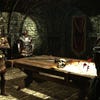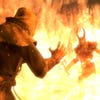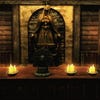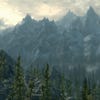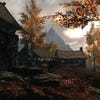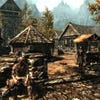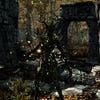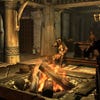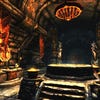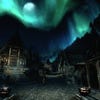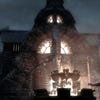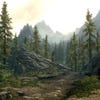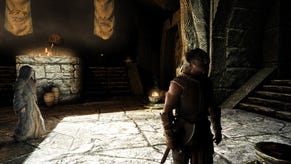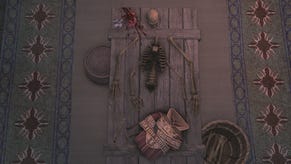The Elder Scrolls 5: Skyrim Review
Mine. Craft.
We can't start at the beginning, of course.
Bethesda hasn't shown the opening scene of Skyrim's anonymous prisoner at preview events and - if you've been sensible enough to stay away from YouTube in recent weeks - it's one you'll be glad you waited for. Likewise, in this review we'll promise to tread gently around the story of a world that is far too rich to be spoiled in words.
And what strikes you very early on in Skyrim is that the world itself is the story. As you work through the game, the discoveries and side quests that pepper the map become compelling explorations, and the world map that initially appears vast for vastness' sake simply comes alive. Focusing on the "main quest" becomes an exercise in futility - everything feels connected and worthy of its place in the world, even if only tangentially connected to the game's overall arc.
Skyrim province lies in the far north of The Elder Scrolls' fantasy world. It's a cold and mountainous region, struggling with its own civil war as it battles the external terrors of an ancient threat. As a Dragonborn, your character possesses both the soul of a dragon and the ability to speak their language in the form of powerful dragon shouts.
At its heart, the story of Skyrim is one of sadness, uncertainty and the selfishness that often underpins the communal strive for the greater good of a revolution. You're clearly every inch the hero of the day, blessed with the potential for extraordinary power. But amongst the conflicting storylines, nothing seems guaranteed.
As Skyrim struggles for its independence, it comes as no surprise to discover that there are those more interested in first ensuring that their own interests ally with that of the inevitable new world order. There's the treachery of wizards, who can't help but meddle in the power of things they can't understand. Assumed enemies turn out to be as perplexed at world events as you and your comrades, and fragile alliances for a common interest develop.
The end result is to leave you feeling heroic, yet vulnerable to both the world around you and the fickle motivations of its inhabitants (while also compelled to see things through to the end). That's an extraordinary achievement in itself. Success by no means feels like a given and, to my mind, only Ico has truly captured that same sense of fearful and uncertain heroism before.
"The end result is to leave you feeling heroic, yet vulnerable to both the world around you and the fickle motivations of its inhabitants."
Composer Jeremy Soule's reliably outstanding handiwork adds an essential, subtle backdrop to Skyrim that contrasts with previous Elder Scrolls outings. The imperial pomp of Oblivion's music - while perfectly suited to the setting of that game - has been replaced by something far gentler and more fragile. It's an ethereal, pastoral fantasy score that's both stirring and sad.
Skyrim itself is a world of eternal winter, where foxes pad through the snow and the northern lights shimmer in the night sky. There's certainly no question that the misty mountain setting, complete will swirling fog and high-altitude snowstorms, has allowed Bethesda's technicians to pull off an extraordinary feat.
But, close up, Skyrim's textures may shock those expecting a generational leap from Oblivion - a game that stunned at release but whose un-modded visuals I believe live on more fondly in the mind than in the flesh. However, while Skyrim's trees have rough edges, its woods are unrivalled in fantasy.
This focus on grandeur over granularity is most evident in the city of Markath, with its leering architecture hewn from the solid rock of the mountains, where waterfalls spill around the buildings. In the courtyard of the College of Winterhold, an angelic statue, arms spread open, bathes in the snowstorms while blue arcane beams reach into the skies all around.
Despite the wintry Nordic theme, there are more subtle strokes that differentiate places from one another. Reaching High Hrothgar - where you're called to develop your dragon shouts by a booming chant of the Greybeards that resonates throughout the land - involves a culturally reverential ascent of a flight of 7000 stairs carved into the mountainside.
The more distinctive visual extremes of Skyrim are to be found underground, amongst the ruins and dungeons littered throughout this vast world. Some of these labyrinths are capable of absorbing an entire evening's play on their own as you fearfully explore amongst the crumbling, dusty ledges, the soft clitter-clatter of skeletal feet echoing around you before the inevitable assault begins.
"There's a tremendous sense of connection between caster and cadaver, and the effects themselves are breathtaking."
In arcane combat, there's a tangible, almost physical sense of feedback from the hiss of a furnace just before those jets of flames engulf your enemies. Thunder echoes quietly in the aftermath of the electrical storm that flows from your fingertips. There's a tremendous sense of connection between caster and cadaver, and the effects themselves are breathtaking. Throughout one evening in the game I stood in the mountains beside a peaceful village, gleefully working through my repertoire of magic tricks while the locals slept below (uneasily, no doubt).
The melee combat is less perfected, but has nevertheless been evolved. Those who specialise in it may not be left feeling quite as satisfied as those who prefer to dabble in the darker arts, but it's still a sweeter deal than the rote, block-and-retaliate combat of Oblivion. Enemies will circle and prod at your defences more effectively, displaying a little more intelligence when exploiting your weaknesses. A similar degree of refinement has been made to Bethesda's famously floaty third-person animations.
On the thorny issue of enemy scaling, you will certainly face insurmountable enemies in your travels - but with the trade-off that you will later destroy them with righteous firepower as you evolve your character. And of those fearsome creatures, the dragons themselves - whose souls are so essential to enhancing your dragon shouts - aren't the nuisance feared by some, instead acting as grandiose events that breathe further life into the world. You'll want to save the cities and people from their wrath.
A process that would have been agonising in Oblivion becomes an open joy in the elegant design of Skyrim's interface. Bookmarked spells allow players to switch from bow to axe to healing powers with a flick of the d-pad as you adapt your combat to a dragon's path through skies and forests.
Skyrim's perks system is presented with equal beauty in the constellation star-signs of the various paths, from Alchemy to Destruction magic or even the deeper virtues of Lockpicking. Go deep into shock perks to unlock the disintegration of the nearly-dead, or invest in Enchanting to add more than one effect to your equipment.
For those who want to experience more of any RPG than their tolerance for stat-planning will usually allow, there's great satisfaction to be had in making use of every game mechanic in order to increase your overall level. But those who wish to specialise and truly master a particular play-style through carefully planned perks will still feel compelled to do so with multiple characters. And then there's crafting.
"Story opportunities present themselves not just from the chatter of villagers around you, but from the vignettes presented as you reach new locations."
Alvor the blacksmith, my new friend, boss and mentor, seems oblivious to the turmoil taking place outside of Riverwood. There's always a hard day's work to be done, after all, and you can't help feeling he'd like you to concentrate a little more on perfecting your crafting than your combat. Though the crafting system in Skyrim amounts to little more than providing the raw ingredients and setting the process in motion, it gives a greater sense of ownership to that new blade. It's a system that will bring no end of satisfaction to the hunter-gatherer who wants something more in return for their efforts in the feral tundra or the sky-high mountain mines.
While characters now embark on a more convincing daily schedule - Alvor himself moves purposefully from forge to grindstone at whatever pace matches the job at hand - they're also more believable by virtue of the brevity of their dialogue. The evolving stories of the people of Skyrim are articulated more succinctly, making for a deeper and richer engagement with the player. Subtitles are disabled by default, and however prone to skipping dialogue you may typically find yourself in a narrative-heavy RPG, I'd urge you to hold back from your instincts and enjoy the much improved voice-acting and exposition of Skyrim's character stories.
Story opportunities present themselves not just from the chatter of villagers around you, but from the vignettes presented as you reach new locations. Arriving in one town, you're presented with an execution scene. Warned that interfering with an execution-in-progress is a serious crime, you'll struggle to resist the temptation to cause havoc anyway. Should you give in to that temptation, the prisoner will attempt to escape and be brought down by the guards, before the wrath of the town descends upon you. You can't say you weren't warned.
During your work for the Thieves Guild, you'll be tasked with infiltrating a home that seems under the perpetual watch of the guard manning the city gates; picking the lock is impossible to do out of plain sight. At this point, you realise that the house can only be accessed in broad daylight and the theft conducted under the nose of a charitable man living in a city consumed by corruption and racketeering. You are a thief though, and you will take those few treasured possessions of the last good man in Riften while he tends to his fireplace. Won't you?
Amongst all of these interactions and branching quest-lines, at the forefront of many players' minds will be the bugs that have plagued some of Bethesda's epic titles. While I'd never recommend abandoning the RPG mantra of saving often, I will note that in my play-through to date, no quest objects have mysteriously vanished, and a wrong word at the wrong time has yet to leave a critical character with an unbreakable silent disposition towards me. For want of a key, I've not found myself trapped underground for all eternity.
In weaving together the extraordinary craftsmanship evident in the music, storytelling, adventure and world design of Skyrim, Bethesda has created a very special game indeed - one that's likely to remain in the affections of gamers for many years to come.
It evokes a word that's overused in reviewing of all kinds: one that's best kept in the cellar in a plainly marked box and reserved only for the most special of occasions. For Skyrim though, I'd like to blow the dust off it, open up the lid, and enjoy a masterpiece with you.






